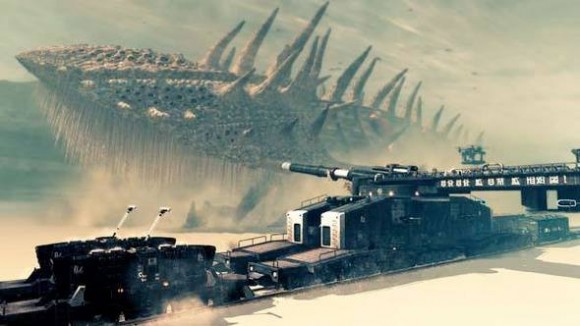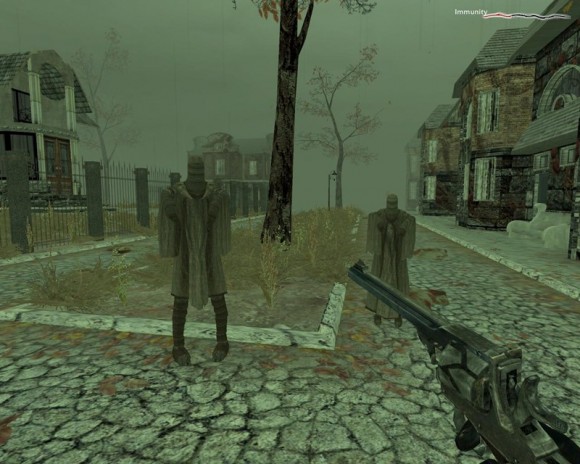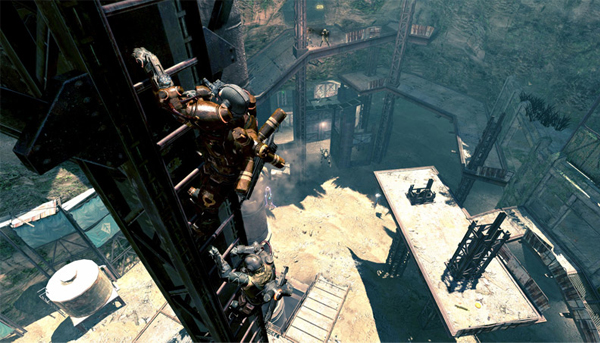Over the last week I’ve been playing a fair bit of Lost Planet 2, a game which I’d previously steered clear of (I had a poor impression of the series after the demo for the first title) but was inspired to try after reading AJ’s inspiring review. I’ve not yet completed the game or tried it in online co-op, but one thing that has struck me about it is how messy the game is.
Now, this is both a strength and a weakness. What’s really impressive about the game so far – after a lacklustre first set of missions – is how varied it is. The game moves you between a variety of environments but more significantly it continually throws new enemies, bosses and scenarios at you. I just got done with a level where you use a train armed with an enormous cannon to fend off the sandworm from Dune.

This level is a real case in point. Because, see, it is awesome. It has an enormous gun, an enormous enemy and is very exciting indeed, and now that I’m done with it I keep thinking about this  tense and cinematic scene. It is also incredibly frustrating, because the game places you on the train and adds some stuff to your HUD that is obviously to do with firing the enormous gun but neglects to tell you how to do anything. After ages spent fruitlessly wandering around the lower parts of the train and firing at Herbert with various small weapons I popped online and learned that you load and fire the gun from the top of the train. Of course! That makes so much sense. You can only get up there by grappling and so obviously the train would be designed with its firing mechanism split over two levels inaccessible to people without wrist-mounted grappling hooks. It makes sense in gameplay terms because you have said grapple, but outside of that it’s as ludicrous as Dead Space 2’s ideas about opening doors with guns and storing money inside your head.
I like the game, but this is not the first time it has irritated me by failing to explain things – or just not bothering at all. But this strikes me as being a difference in philosophy. Having read AJ’s review it’s clear that Lost Planet 2‘s campaign is intended as a co-operative experience to be repeatedly revisited; this is a fairly common aspect of Japanese game design philosophy. By contrast, Bulletstorm – which I loved and AJ hated – does everything in its power to make your experience, objectives and controls clear and obvious every step of the way. Frustration with the game, for me at least, was derived solely from occasional difficult spikes (usually just involving my having to learn the ropes with a new weapon or enemy). And I think that this obsessive emphasis on the player’s experience being gentle and smooth, of the game taking great efforts to ease the gamer in, often goes hand-in-hand with an experience so polished that rough edges like different approaches, vast swathes of semi-redundant content, unique player experiences and significant gameplay variation are worn away. After all, if you’re going to put your game through so much QA that just about every unpredictable moment is removed, then ultimately the gaming experience it offers is going to be predictable.

I’m aware that I’ve just been wittering on about different design philosophies rather than trying to ask a question, so let me boil this down: do you, personally, lean more towards the ‘Eastern’ philosophy of expecting players to figure things out for themselves but showering them with variation and content, or the ‘Western’ philosophy of assuming a single playthrough should be as polished and total as possible?
Obviously the question isn’t as simple as that, and I’ve reduced the issue greatly in an attempt to sum it up quickly. I also think there are a lot of strengths to the Valve- and Bungee-pioneered approach of extensive QA focusing on points where players give up and stop playing – I know I’ve abandoned a lot of games at points where difficulty and confusion conspired to destroy my fun. Plus triple-A Western games are obviously making efforts to vary up their content – even the Call of Duty series has introduced lots of levels that are basically variant minigames to spice things up. But as the starting point for a bit of discussion around these ideas I think it will do. So go on then: what’re your thoughts?

Comments
6 responses to “QOTW: Do you like your games untidy or neat?”
Errrrrrmmm… both.
Figuring stuff out for yourself is the clear better option for me, but only if you successfully do it. It's a high risk/high reward thing, cos if you fail to learn it, that sucks.
A couple of days ago in Crysis 2, I realised that pressing 'left' on the D-Pad changes your ammo type. This made the game a hell of a lot easier and much more fun. Great success.
However, two days previously, I was frustrated and not enjoying the game much. That is one of the many things it could have told me to help alleviate that. Great fail.
'tis all about the balance. I don't think players should have to figure out control schemes themselves, that should be laid out clearly and openly, unless somehow it's factored into the gameplay (can't think of an example of that – oh, yes I can, the original arcade Street Fighter), but some stuff is a joy to discover.
I remember finding out about the secondary fire mode in Blood by just playing around, basically the same example as above. Unlike Crysis 2, I hadn't been disadvantaged until I discovered it. Once I tripped over that button by accident and realised the possibilities, the game didn't get any smoother or easier, just more fun and varied. That's the kind of discovery that should be left up to us to stumble upon.
Funny, I was about to bring up Crysis 2 but for different reasons.
When it comes to mission goals or tasks I like them to be described well enough but not dictated and charted out for me. In the case of the Lost Planet 2rain (weak, I know), a simple blurb or instruction to get to the top of the train would suffice for me nothing more, I'll work out how to get there on my own.
With Crysis 2 there is nearly no point that you don't know exactly where you are supposed to go for one reason or another. If there isn't an NPC hustling you through a section with his incredibly repetitive and unvaried banter (I just want to look around dammit!) then your own nanosuit tells you there are tactical options which then lay out every little detail of ammo or stealth route around the area even if it is beyond your line of sight. Now obviously you can ignore the tactical option all together but what you can't ignore is one person or another droning on into your headset setting up your primary mission which is always overlayed onscreen, because nobody could be bothered to look at the map at the bottom left of the screen, right?
I don't mind the onscreen overlay all that much in certain games though I much prefer it represented on a map. Operation Flashpoint: Dragon Rising comes to mind as a game that was slightly better for showing you where you needed to go, if simply because it would otherwise be pretty easy to get a bit lost. In Crysis 2 it's hardly feasible that you could get lost and if so, you'll probably work it out on your own pretty quickly.
So in the long run I have to agree with Dylan, I like a little bit of both worlds, I don't want to be have my hand held, but I also don't think one should be left completely alone, at least not ALL the time.
I like it messy. Lets take LP2 again as an example. On a sandy train level, you have to keep a giant worm from eating the train while moving up the train. Again, nothing is explained. I played it alone first, than with friends.
When playing with friends, they explained me a way to do it, while I was using a completely different, barely related way. he didnt know about mine, and I didnt know about his. the result was awesome. By using both our tactics, we destroyed the level very easily.
In the end, messy is fine, if the puzzles offer different solutions and ways to experiment. Tutorials piss me off, as is assisted gameplay. Well placed and intelligent hints on the other hand…
It's probably not that surprising that there's a lean towards the messier style of design since, as people have identified, that allows so much more scope for exploration, discovery, and developing your own little stories to share with friends.
What I'm now trying to figure out is just why I have so much patience for the "tug-by-the-ear" blockbuster approach, as I seem to have a much higher tolerance for it than most. It might just be that I'm a deeply unsophisticated gamer! I don't really think that's true, but 'tis not for me to judge. Perhaps it's just that as someone who splits his spare time between a lot of different things, sometimes I like a simple, fun and brainlessly challenging experience to dip into? But that doesn't explain why I spent a full day playing Bulletstorm to completion.
Possibly such games tickle the same part of my brain that enjoys rubbish blockbuster films; it's an escapist impulse, standing in contrast to the part of me that likes to watch films of substance like Fishtank or Stalker.
That makes a lot of sense. Some times you don't want to be challenged, it is a simple case of 'give me something I can attach myself to and just keep it simple'.
I spend so much time playing games that sometimes I can play a straightfoward game, but I have a tendency to skip cut-scenes so story outside pure gameplay bores me, so I like it less when the game gives me an 'interactive' cut-scene, but really all they have done is made me walk around in a narrative I have no interest in.
[…] is part 1 of a 2 part series exploring a collection of diverse ideas. Primarily they tie into a QoTW posted here on Arcadian Rhythms a while back. However, there are various other articles also […]